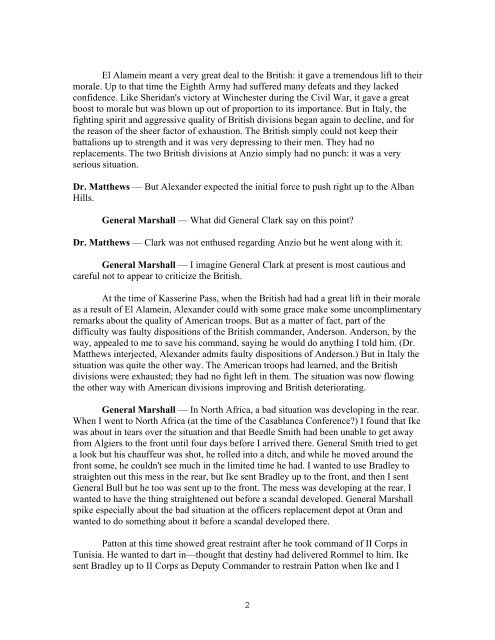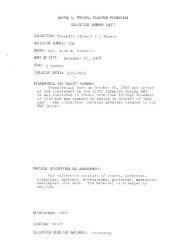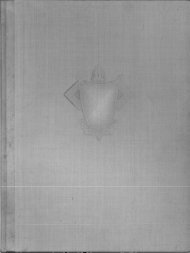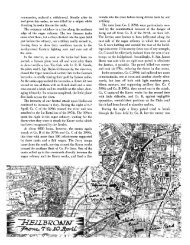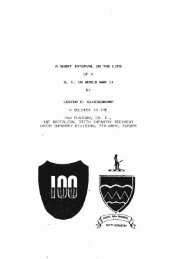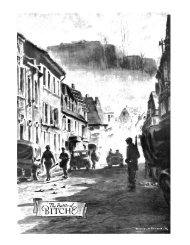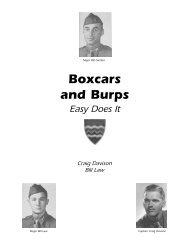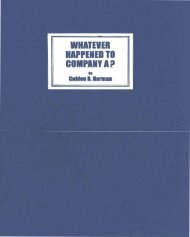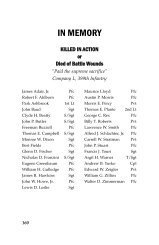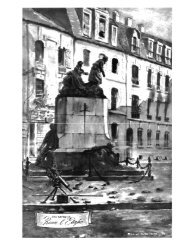July 25, 1949 - The George C. Marshall Foundation
July 25, 1949 - The George C. Marshall Foundation
July 25, 1949 - The George C. Marshall Foundation
Create successful ePaper yourself
Turn your PDF publications into a flip-book with our unique Google optimized e-Paper software.
El Alamein meant a very great deal to the British: it gave a tremendous lift to their<br />
morale. Up to that time the Eighth Army had suffered many defeats and they lacked<br />
confidence. Like Sheridan's victory at Winchester during the Civil War, it gave a great<br />
boost to morale but was blown up out of proportion to its importance. But in Italy, the<br />
fighting spirit and aggressive quality of British divisions began again to decline, and for<br />
the reason of the sheer factor of exhaustion. <strong>The</strong> British simply could not keep their<br />
battalions up to strength and it was very depressing to their men. <strong>The</strong>y had no<br />
replacements. <strong>The</strong> two British divisions at Anzio simply had no punch: it was a very<br />
serious situation.<br />
Dr. Matthews — But Alexander expected the initial force to push right up to the Alban<br />
Hills.<br />
General <strong>Marshall</strong> — What did General Clark say on this point?<br />
Dr. Matthews — Clark was not enthused regarding Anzio but he went along with it.<br />
General <strong>Marshall</strong> — I imagine General Clark at present is most cautious and<br />
careful not to appear to criticize the British.<br />
At the time of Kasserine Pass, when the British had had a great lift in their morale<br />
as a result of El Alamein, Alexander could with some grace make some uncomplimentary<br />
remarks about the quality of American troops. But as a matter of fact, part of the<br />
difficulty was faulty dispositions of the British commander, Anderson. Anderson, by the<br />
way, appealed to me to save his command, saying he would do anything I told him. (Dr.<br />
Matthews interjected, Alexander admits faulty dispositions of Anderson.) But in Italy the<br />
situation was quite the other way. <strong>The</strong> American troops had learned, and the British<br />
divisions were exhausted; they had no fight left in them. <strong>The</strong> situation was now flowing<br />
the other way with American divisions improving and British deteriorating.<br />
General <strong>Marshall</strong> — In North Africa, a bad situation was developing in the rear.<br />
When I went to North Africa (at the time of the Casablanca Conference?) I found that Ike<br />
was about in tears over the situation and that Beedle Smith had been unable to get away<br />
from Algiers to the front until four days before I arrived there. General Smith tried to get<br />
a look but his chauffeur was shot, he rolled into a ditch, and while he moved around the<br />
front some, he couldn't see much in the limited time he had. I wanted to use Bradley to<br />
straighten out this mess in the rear, but Ike sent Bradley up to the front, and then I sent<br />
General Bull but he too was sent up to the front. <strong>The</strong> mess was developing at the rear. I<br />
wanted to have the thing straightened out before a scandal developed. General <strong>Marshall</strong><br />
spike especially about the bad situation at the officers replacement depot at Oran and<br />
wanted to do something about it before a scandal developed there.<br />
Patton at this time showed great restraint after he took command of II Corps in<br />
Tunisia. He wanted to dart in—thought that destiny had delivered Rommel to him. Ike<br />
sent Bradley up to II Corps as Deputy Commander to restrain Patton when Ike and I<br />
2


